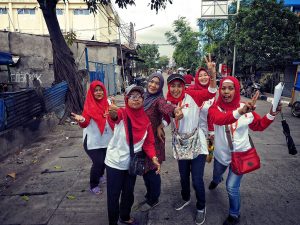Community-based volunteers play an essential role in reaching out to Jakarta’s marginalised population who are sick at home without access to basic healthcare.

The first day of the training brought the volunteers and the medical professionals from the Puskesmas together in a classroom in order to introduce the idea of collaboration to bring better accessibility to health assistance for those who are sick at home.
The ensuing two days of training included a structured, in-class discussion about the critical role of volunteers in helping bring health assistance to those at home. The prevalence of people living at home with chronic disease, HIV and cancer is on the rise in Indonesia and management of their needs in the community can be very complex and often inadequate. The volunteers learned how to identify those who need help; to assess and care for not only the physical needs, but also learn to identify and address the emotional, psychosocial and spiritual needs that are often just as great as the physical needs. They learned the importance of communication skills when working with people living with life limiting conditions, and the importance of collaboration in order to bring a holistic care to those in need. The CNPC’s interactive method of teaching engaged the volunteers in activities such as patient case discussions, role-play and group work. The use of role-play emphasized the importance of communication during volunteer interaction with the patient and family in the community setting. Discussing health concerns, especially conditions which are life limiting, can be difficult and confronting. It was therefore essential that volunteers learned how to develop a trusting rapport with the patients and family and interact with great care, awareness and respect, while at the same time acknowledging their own emotions and values about end of life. After the in-class program, the volunteers were provided with the opportunity to take what they had learned and applied it in practice in the patient’s home. Rachel House Senior Nurses facilitated home visits where volunteers used what they have learned to holistically assess the needs of the patients and help them access the assistance they need in order to live comfortably at home. This in-field experience allowed the volunteers to see how they can be an effective bridge for these patients to access not only medical assistance from the Puskesmas but also other social and economic assistance when necessary.
After the completion of the training, volunteers felt more confident and expressed their enthusiasm and commitment in wanting to become community advocates for those who are ill at home. With the training provided by Rachel House they felt more prepared to reach out to their community to ensure suffering by those with life-limiting conditions can be alleviated as much as possible.
Rachel House thanks the CNPC volunteers who have dedicated their time to provide care and support to their community. Engagement of volunteers is critical in Indonesia where the health system is still struggling due to the shortage of medical professionals. Trained volunteers can be the health extension workers that supplement the health care system and hopefully provide better accessibility and availability to health care for all in Indonesia.